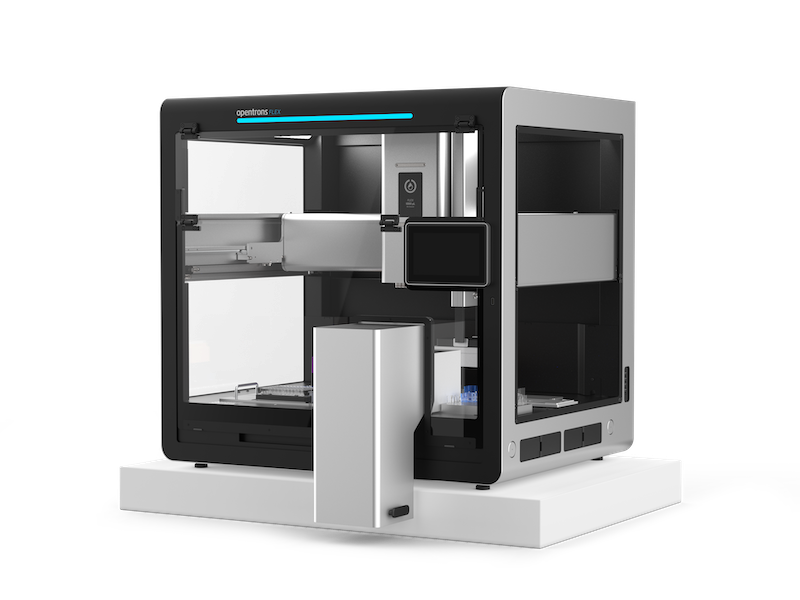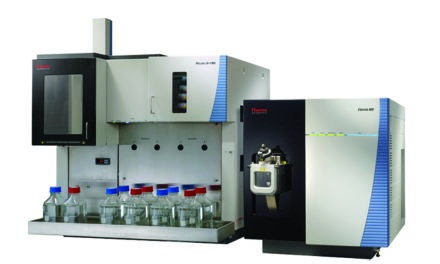Summary:
Opentrons Labworks, Inc. has launched the Opentrons Flex Proteomics Workstation, an affordable automated system for proteomics workflows, streamlining tasks like MS sample preparation while reducing hands-on time for researchers.
Takeaways:
- The workstation expands Opentrons’ Flex lineup, offering automation for common proteomics workflows, including protein digestion, quantification, and purification.
- Automation addresses bottlenecks in proteomics by improving consistency, reducing sample loss, and enabling high-throughput research.
- Priced in the mid-five figures, the system makes advanced MS automation accessible to labs with limited budgets, though it is not available in certain European markets due to patent restrictions.
Opentrons Labworks, Inc., has introduced its Opentrons Flex Proteomics Workstation, an automated system for common proteomics workflows, including preparing mass spectrometry (MS) samples at a cost significantly below the six-figure range common in proteomics automation. It automates steps such as protein digestion (SP3), quantification, labeling, and purification, streamlining processes that typically require significant hands-on time for bench scientists.
Flex Proteomics Workstation Expands Flex Lineup
This new workstation expands on the Opentrons Flex lineup, which recently surpassed 100 published protocols in techniques like NGS library preparation, nucleic acid extraction, and cell-based assays. Until now, many proteomics workflows involved hours of manual pipetting, plate transfers, and wash steps that slow down research. The Flex Proteomics Workstation combines a liquid handling platform with an on-deck plate reader, heater-shaker, and magnetic block. Researchers can run multiple different proteomics sample preparation workflows on one platform, with the ability to use pre-existing verified protocols developed by the Opentrons’ team or develop new protocols themselves.
“Protein analysis is essential for labs working on biomarker research and potential drug targets, but it often requires repetitive, time-consuming tasks,” says James Atwood, General Manager of Robotics at Opentrons. “By using the same approach we applied to genomics workflows, we are enabling labs to process more samples per day without adding staff. Our proteomics workstation automates high-throughput MS sample prep and eases the burden of scaling up these workflows.”
Automation Important for Proteomics
According to Hanno Steen, PhD, director of the Proteomics Center at Boston Children’s Hospital and Professor of Pathology at Harvard Medical School, automation has special importance in proteomics.
“Despite its potential to transform disease research, proteomics has long been bottlenecked by slow, manual sample preparation. Automating these front-end workflows isn’t just about saving time—it’s about ensuring consistency, minimizing sample loss, and making high-throughput proteomics a reality,” he says. “With the right technology, labs can finally process thousands of samples with the speed and precision needed to unlock new biomarkers and drive the next wave of targeted therapies.”
The Flex Proteomics Workstation is the latest automated solution to be launched by Opentrons, which has over 10,000 installed robots worldwide, including at top universities, biopharma companies, and early-stage biotechs. Pricing is set in the mid-five figures, giving labs with modest budgets and limited space an opportunity to adopt advanced MS automation.
Flex Proteomics Workstation Will Be Shown at US HUPO Conference
The Flex Proteomics Workstation will be shown at the upcoming US HUPO conference (February 24–25).
Currently, the Opentrons Flex Proteomics Workstation and the Opentrons Flex Absorbance Plate Reader are not available for sale in the Contracting States of the European Patent Convention (e.g. the E.U., Iceland, Norway, UK, Switzerland), and may not be offered, used, or put on the market in those states due to a third-party patent application (EP 4078144) and German Patent DE102019134846.
Featured Image: The Opentrons Flex Proteomics Workstation is an automated system for common proteomics workflows, including preparing mass spectrometry (MS) samples at a cost significantly below the six-figure range common in proteomics automation. Photo: Opentrons





